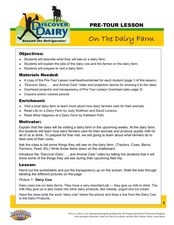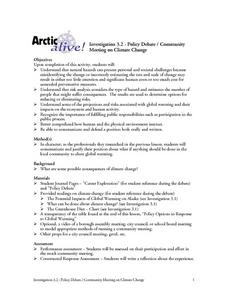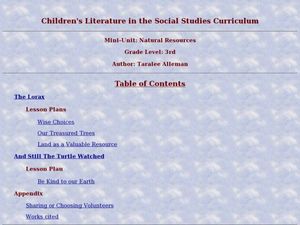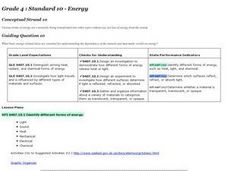Curated OER
Basic Tree and Forest Measurements
Young scholars examine how trees are measured and the different methods used. In this density activity students divide into groups and practice the different methods.
Curated OER
On The Dairy Farm
Students investigate dairy farming. In this farming lesson, students list various things they may see on a dairy farm and watch the video "Discover Dairy...And Animal Care." Students take a field trip to an actual dairy farm and record...
Curated OER
Oil and Gas As A Source of Energy
Students discuss the reasons why oil and gas are the United States' main source of energy. In groups, they use the internet to research how the resources are formed and the amount of consumption by the United States. They choose books...
Curated OER
Policy Debate / Community Meeting on Climate Change
Students investigate how natural hazards can present personal and societal challenges as well as the cost involved. They assess the risk analysis considerations with global warming and their impacts on an ecosystem. An estimate of the...
Curated OER
Corrosion/Conservation/Preservation
High schoolers examine the reasons why metal corrodes in regard to metal artifacts. In groups, they discover the affects of salt water on metal and compare the type of corrosion found on iron. They also research the types of metal...
Curated OER
Reservoirs and Production
Students complete activities for a lesson about reservoirs and production. In this geology lesson, students complete a 7 page packet of activities to explore porosity, permeability, and rock properties.
Curated OER
Understanding Digestion
Young scholars analyze data from their primary literature (textbook) and explore multiple
aspects of digestion by generating alternative or multiple explanations for questions posed during the lesson. This lesson includes a handout...
Curated OER
Second Time Around
Young scholars explore how items can be reused. In this recycling lesson, students present skits about reusing materials and brainstorm products that can be reused at home, school and in the classroom.
Curated OER
Working Animals
Young scholars examine the need for the humane treatment of animals. In this animal welfare lesson, students realize the need for animal welfare, and decide on a service project that will promote it. The lesson culminates in the creation...
Curated OER
Higher and Higher: Amazing Skyscrapers
Students brainstorm the names of skyscrapers then get into groups and create their own skyscraper. In this architecture lesson students answer questions about their skyscraper after creating one.
Curated OER
Be Kind to our Earth
Learners make a list of ideas on ways we can take care of our Earth and complete a class project planning sheet where they problem solve to help save the Earth. In this Earth lesson plan, students also play a conservation charades game.
Curated OER
Energy
Students see that energy is everywhere in nature - in the light of the sun, in wind, in falling water and erupting volcanoes. Without energy, there is no life. This lesson provides many good ideas across the curriculum to study energy.
Curated OER
Make Your Own Thermometer
Young scholars recognize the concept of temperature, including degrees, and the melting and freezing process. In this 1st - 2nd grade lesson plan, students identify the temperature of various objects, as well as create their own paper...
Curated OER
How to Speed Up a Slow Grandfather- The Pendulum
Students explore the concept of periodic motion in relation to its function in a Grandfather type clock. In this periodic motion lesson, students use problem-solving skills and understanding of periodic motion to participate in a group...
Curated OER
In the Eye of the Storms
Tenth graders study the major hurricanes of the Atlantic Ocean. In this weather lesson plan, 10th graders read an article and answer various questions. Students discuss their findings with their classmates.
Curated OER
Cupcake Core Sampling
Students discuss core samples. In this environment lesson plan, students experiment discovering what is beneath the surface by using cupcakes as models finding out what sort of layers are found within the cupcakes.
Curated OER
Exploring Human History
Young scholars study the four main subdivisions of anthropology and how they overlap. They explore the careers of several contemporary anthropologists and their fieldwork, comparing the methods and applications of their work.
Curated OER
Becoming A Career Detective (Part 2)
Third graders review and expand their discussion of job training and education resources. They work in small groups to find information about the types of training people need to do specific jobs and use data from interviews carried out...
Curated OER
Are You One of Us?
Students compare and contrast insects and arthropods, identifying characteristics of each. In groups, they sort pictures of arthropods into the five different classes of arthropods. They also sort pictures into insect and non-insect piles.
Curated OER
Are You One Of Us?
Students discover how to classify things based on their similarities and differences. Students give the characteristics of insects and create a classification list. Given examples of various types of insects, students classify them...
Curated OER
Taking Action
Students use the net they make to dip macroinvertebrates at or below the surface. The flat side of the net allows pressure on the substrate so that organisms do not escape under the net. Two students hold onto the handles and submerge...
Curated OER
Science with Mud!
Eighth graders give some examples of chemical reactions they see everyday. In this chemistry lesson, 8th graders investigate how much water soil can hold. They collect data and compare results with others.
Curated OER
It Takes All Different Kinds
Fourth graders are introduced to the types of jobs a veterinarian does in a typical day. In groups, they brainstorm a list of items they believe they do and discuss how they help animals live healthy lives. They also complete an...
Curated OER
Traveling the Career Paths 2
Students discover the six different career paths they could take and why each path is important. In this career choice lesson, students discuss different career paths using a visual poster. Students then play...

























